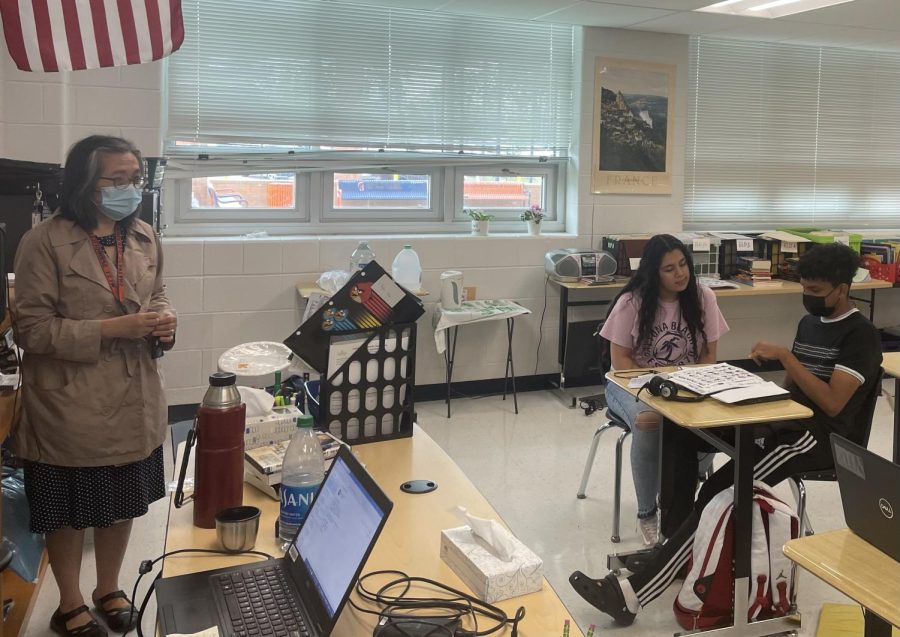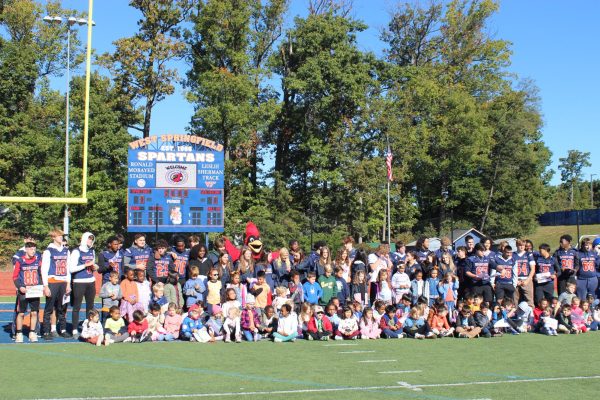Peer Tutoring on death row
Photo courtesy of Robbie Kugler
Senior Nahomy Vasquez Garcia working with a tutee. The Peer Tutoring Center has partnered with Strategies for Success teacher Ying Smith to deliver more individual assistance and fundamental services to students.
The Spartan Peer Tutoring program is in its final days, as administration plans to cancel the class next year due to alleged low enrollment numbers.
“The county gives us a certain amount of staffing,” said principal Michael Mukai. “They give us one section per every 30.5 students. In this case, Peer Tutoring had eight kids signed up. You would have to have a class of 52 [students], which I can’t have. We don’t even have rooms that would fit 52 [students], or, 11 classes that have to have 32 [students] to make up for the eight [students]. We’d love to have [Peer Tutoring next year], but [we’ve got to] get more kids to sign up for it.”
Low enrollment is an unfortunate but common occurrence, as every year classes are scrapped due to a lack of student interest. However, the death of Peer Tutoring is far more complicated because the majority of students who applied and were approved to become tutors next year were not properly factored into the course selection process.
“When students go to register, they can put Peer Tutoring as a backup elective but they cannot register for it themselves because it’s an application-based class,” said Peer Tutoring adviser Melissa Morgan. “As of March 28th, we had 15 people registered, with four people who had not yet signed up for the class. One of whom thought she had [registered], another one hadn’t met with her counselor, and another was told that [Peer Tutoring] conflicted with Journalism. And I’m not sure about the fourth one, but that student [confirmed] that she wanted to take [the class].”
While holding a class for just eight students would be a logistical challenge, the class was run this year with 17 students, and student interest was actually higher than that mark going into next year. Somewhere along the line, a discrepancy arose between the number of students counted for Peer Tutoring and the actual number of students who wanted to take the class, thus making it appear as if they had not hit a high enough enrollment mark to keep the program afloat. Not only is low enrollment not an issue, but engagement from the larger student body is not declining either. As detailed by two of our tutors at a recent national conference, partnerships with other student groups have helped the Peer Tutoring program rebound this year.
“The Secondary Schools Writing Center Association (SSWCA) is a national organization of all the secondary school and high school writing centers and peer tutoring centers,” said senior Jacqueline Welsh. “They gather every year and have an informational conference about a theme, and students, staff, faculty, advisers, or just scholars come and discuss a topic. This year, the theme was Revolutionary Partnerships, so [senior] Carolyn [Richardson] and I researched and created a presentation regarding the partnership between National Honor Society (NHS) and the Peer Tutoring center.”
During the 2020-2021 school year, the Peer Tutoring center was largely gutted. Foot traffic from students was meager due to virtual learning, and there was no extracurricular tutoring available. According to data compiled by Richardson and Welsh, a new partnership with NHS, as well as pre-existing connections with Strategies for Success and English Speakers of Other Languages (ESOL) classes, has helped the number of Peer Tutoring sessions held this year greatly exceed the anemic 2020 rates. Extracurricular sessions and ESOL sessions have both grown to surpass 2019 rates, and non-ESOL lunch sessions and are still up compared to 2020. On the whole, while the number of tutors and tutees is still down compared to pre-pandemic rates, the program is clearly rebounding, which puts the program’s sudden cancellation under even greater suspicion.
“We have been given a variety of reasons [for the cancellation], some of which are not even true,” said senior Samantha Korff. “We’ve been told things about [how] there was a new tutoring resource that was bought by the county called tutor.com, and that was one of the many supposed reasons for the ending of Peer Tutoring; that these services would be sufficient [for students], and, basically, our services were no longer needed.”
Fairfax County Public Schools (FCPS) recently signed a huge, multi-million dollar deal with tutor.com to guarantee all students 24/7 access to free, online tutoring, which Mukai claims was not a factor in the decision. Nonetheless, tutor.com is acting as a direct replacement for the Peer Tutoring program, which does not bode well for students, since, statistically speaking, asynchronous tutoring is far less effective than face-to-face tutoring.
While certainly a reputable service, tutor.com will likely not be able to replicate the results achieved by our peer tutors. According to a recent survey conducted by senior Lizette Terrillion, 91.8 percent of the 70 students polled preferred in-person tutoring over online tutoring. Granted, students will have access to other in-person tutoring resources next year, as many of the Honor Societies offer tutoring help and students will still be able to ask their teachers for help. These options are seen as sufficient by the administration, but our tutors are increasingly concerned that, even collectively, they will not be able to match the individualized, peer-to-peer support offered by Peer Tutoring.
“I primarily tutor [WS]’s English-learning population,” said Korff. “Having tutored English learners for nearly three years now, I cannot understate just how important it is that students have access to services like [Peer Tutoring]. Because we know how foundational these support services are to these students’ successes. And to then take those away, it goes against everything that [WS] has said about their devotion to equity and equal access to learning.”
The extensive networking and connections that have been built between the Peer Tutoring program and other teachers around the building allow for more personal, fundamental assistance than any of the alternative methods that will be offered next year. To that end, Morgan and all of our peer tutors have vowed to continue fighting and hope the administration will recant.
For now though, our Peer Tutoring program remains on death row. And, when students know how important Peer Tutoring is, teachers know how important Peer Tutoring is, and administrators know how important Peer Tutoring is, that seems like an outcome nobody really wants and nobody really benefits from.






